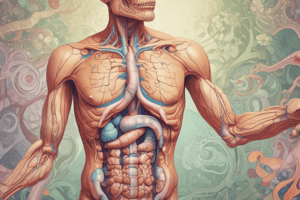Podcast
Questions and Answers
Which type of vomiting indicates the presence of bile in the contents?
Which type of vomiting indicates the presence of bile in the contents?
- Yellow (correct)
- Coffee grounds
- Deep brown
- Frank blood
What is frank blood in stool indicative of?
What is frank blood in stool indicative of?
- Colon cancer progression
- Bleeding higher in the intestinal tract
- Digestive issues in the stomach
- Bleeding in the anal canal or rectum (correct)
Which of the following is NOT a cause of dysphagia?
Which of the following is NOT a cause of dysphagia?
- Neurological defects
- Mechanical obstruction
- Hiatal hernia (correct)
- Muscular disorders
What symptom typically characterizes GERD?
What symptom typically characterizes GERD?
Which type of hiatal hernia affects the entire circumference of the esophagus?
Which type of hiatal hernia affects the entire circumference of the esophagus?
What is a common risk associated with untreated chronic gastritis?
What is a common risk associated with untreated chronic gastritis?
Which condition is characterized by food getting trapped in a blind pouch?
Which condition is characterized by food getting trapped in a blind pouch?
What is a typical treatment for gastroesophageal reflux disorder (GERD)?
What is a typical treatment for gastroesophageal reflux disorder (GERD)?
What does melena in stool indicate?
What does melena in stool indicate?
Which type of dysphagia occurs due to a failure of the lower esophageal sphincter to relax?
Which type of dysphagia occurs due to a failure of the lower esophageal sphincter to relax?
What is a common symptom of a hiatal hernia?
What is a common symptom of a hiatal hernia?
What type of blood is detectable only through specific testing?
What type of blood is detectable only through specific testing?
Which treatment is NOT typically used for gastroesophageal reflux disorder (GERD)?
Which treatment is NOT typically used for gastroesophageal reflux disorder (GERD)?
Which symptom is associated with frequent vomiting after meals?
Which symptom is associated with frequent vomiting after meals?
What causes chronic gastritis mainly?
What causes chronic gastritis mainly?
Which of the following does NOT indicate a systemic response in digestive symptoms?
Which of the following does NOT indicate a systemic response in digestive symptoms?
Flashcards
Vomiting Characteristics
Vomiting Characteristics
Different vomit colors indicate locations of bleeding or issues like gastric emptying problems.
Blood in Stool (Melena)
Blood in Stool (Melena)
Dark stool (melena) indicates bleeding higher in the intestines, often associated with issues in the large intestine (e.g., colon cancer).
Dysphagia Causes
Dysphagia Causes
Dysphagia, or difficulty swallowing, can stem from neurological problems, muscle disorders, or blockages.
GERD symptoms
GERD symptoms
Signup and view all the flashcards
Acute gastritis causes
Acute gastritis causes
Signup and view all the flashcards
Hiatal Hernia types
Hiatal Hernia types
Signup and view all the flashcards
Anorexia/Nausea/Vomiting causes
Anorexia/Nausea/Vomiting causes
Signup and view all the flashcards
Chronic Gastritis Cause
Chronic Gastritis Cause
Signup and view all the flashcards
Coffee grounds vomit
Coffee grounds vomit
Signup and view all the flashcards
Yellow vomit
Yellow vomit
Signup and view all the flashcards
Frank blood in stool
Frank blood in stool
Signup and view all the flashcards
Occult blood in stool
Occult blood in stool
Signup and view all the flashcards
Achalasia
Achalasia
Signup and view all the flashcards
GERD treatment
GERD treatment
Signup and view all the flashcards
Study Notes
General Digestive Symptoms
- Anorexia, nausea, and vomiting can indicate digestive system problems or other conditions like infections or kidney failure.
- Vomiting characteristics can help diagnose problems.
- Coffee-ground vomit suggests stomach or intestinal bleeding.
- Yellow vomit may come from the duodenum.
- Deep brown vomit can come from the jejunum or ileum.
- Visible blood in vomit is called "frank blood."
- Frequent vomiting after meals suggests issues with gastric emptying or a pyloric obstruction.
- Blood in stool can be a sign of bleeding in the anal canal or rectum.
- Dark stool (melena) suggests bleeding higher in the intestines.
- Blood in stool can be a symptom of colon cancer, although not always immediately detected.
Dysphagia
- Dysphagia is difficulty swallowing.
- Causes include neurological issues, muscular problems, or mechanical obstructions.
- Specific types include achalasia (sphincter fails to relax), congenital atresia (disconnection), stenosis (narrowing), diverticulum (trapped food), or tumors.
Hiatal Hernia and GERD
- Hiatal hernias occur when the esophagus passes through the diaphragm.
- Axial hernias affect the whole circumference.
- Para-esophageal hernias are one-sided.
- GERD (Gastroesophageal Reflux Disease) is characterized by stomach contents flowing back into the esophagus.
- Burning, worsening with bending or lying down, and chronic coughing are common symptoms.
Stomach Disorders
- Acute gastritis is inflammation of the stomach lining.
- Common causes include aspirin/NSAIDs, chemotherapy, alcohol, and gastric radiation.
- Chronic gastritis has more persistent causes, including H. pylori infection and autoimmune issues attacking the stomach's parietal cells (associated with B12 deficiency).
- Ulcers are a breakdown of the stomach lining. Peptic ulcers commonly occur in the duodenum, while gastric ulcers are in the stomach.
Inflammatory Conditions
- Inflammatory bowel diseases (IBD) cover Crohn's disease and ulcerative colitis.
- Crohn's disease can affect any part of the digestive tract, while ulcerative colitis typically affects the colon and rectum.
- Both can cause abdominal pain, diarrhea, and rectal bleeding. The symptoms can also come and go (exacerbation and remission).
- Peritonitis is inflammation of the peritoneum (lining of the abdomen).
Studying That Suits You
Use AI to generate personalized quizzes and flashcards to suit your learning preferences.
Related Documents
Description
This quiz covers general digestive symptoms such as anorexia, nausea, and vomiting, along with specific characteristics of vomit that indicate potential problems. It also delves into dysphagia, its causes, and the various types of swallowing difficulties. Test your understanding of these critical digestive disorders.




